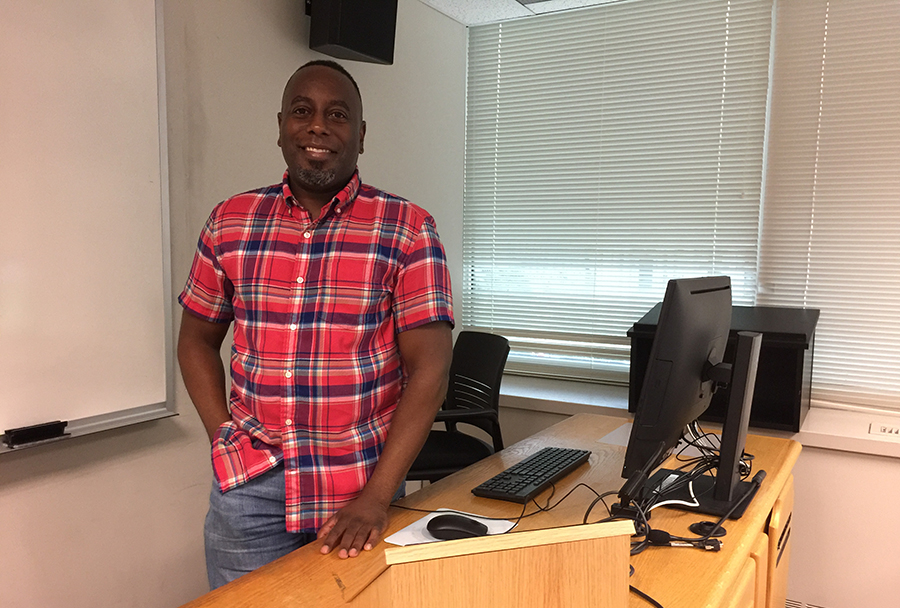Graduate students trickled into a Center City building used by Temple University on a recent Saturday morning. They plugged in their laptops and opened packages of yogurt.
Lee Carson stood at the front of the room. He’s a licensed social worker and trainer on various topics that help nonprofit organizations better serve their clients, in which he often frames his training and teaching through an intersectional framework. Carson was ready to talk to his class about social work-assessment questions. He said if professionals do not ask the right questions, they would likely have blind spots in their treatment plans.
They could end up focusing on a client’s anger, “but really the anger comes from trauma,” Carson said, “and so without treating the trauma, it’s not going to have that much of an impact on the anger.”
Carson showed portions of the VICE News series “Last Chance High,” and the students discussed Cortez Shields, who said he enjoyed fighting in school. A counselor later takes Shields to visit his father in jail.
The class discussed contracting, a method social workers use to have clients help determine a plan of intervention for certain behavior.
“All behavior has context,” Carson said several times during his class. He advised having short-term goals that reward clients as they progress instead of withholding positive reinforcement until the end of a planned intervention.
“What I like about [teaching] is that I feel like I get to kind of mold them a little bit, you know, because they’re kind of early in the program,” Carson told PGN. “I have a very client-centered approach that I really encourage them to think about.”
His students like him in return; Carson has a “Rate My Professor” webpage full of glowing remarks like “gives good feedback,” “hilarious” and “caring.”
After his Temple class, Carson rushes to the Northwest Regional Center of the Community College of Philadelphia, where he teaches an introductory-level course on helping skills. The Saturday before OUtFest, he also attended the Philly Trans* March and the Indigo Ball, at which The COLOURS Organization was honored as Community Partner of the Year.
During the week, Carson splits his time among serving as interim executive director of COLOURS, director of training for The Ladipo Group and attending to clients on Talkspace, an online therapy platform.
“I have like five part-time jobs,” Carson joked, “and people are like, ‘Lee, how do you do all that?'”
Carson came to human services thanks to a chance encounter in the 1990s with a classmate who talked about a health-science program at the State University of New York at Brockport, near where he grew up in Rochester. Carson began focusing on chemical-dependency counseling and later worked at the MOCHA Center for LGBT communities of color.
He remembered feeling surprised that a small city like Rochester would have such a focused organization. After a few years, Carson wanted to branch out. he went back to school for his master’s degree in social work. He decided to move to Philadelphia after graduating in 2004.
“I just wanted to be in a bigger city that would afford me more opportunity,” Carson said. “I’d been in Rochester all my life.”
He landed a job as a research associate at the Philadelphia Health Management Corporation, now called the Public Health Management Corporation. Carson also took on a role at Mazzoni Center as a fee-for-service therapist in the Open Door counseling program and saw clients in person after he became a licensed social worker in Pennsylvania in 2006. He got involved in the LGBT scene right away, leading the Black Gay Men’s Leadership Council.
Because Carson has always juggled multiple tasks, he felt like a good fit to help shepherd COLOURS through its leadership transition. Former executive director Mark Wilson left the organization in the spring. Carson said he’s focused on supporting the staff and partnering with other community organizations. COLOURS is looking for a new building and also evaluating ways to find funders beyond the AIDS Activities Coordinating Office.
“Quite honestly, [for] the needs of our clients, I feel like we do a disservice to some degree if we don’t have behavioral-health services in our organizations,” Carson said. “HIV is not eh only thing that our clients are dealing with.”
He mentioned the need for services related to housing, employment, emotional wellness and substance abuse.
Carson also plans to rejuvenate The Crystal Ball, an annual fundraiser. This year it takes place 6 p.m. Nov. 26 in Dorrance Hall at The University of the Arts, Broad and Pine streets. For more information, search “The Crystal BALL 2016” on Facebook.
In the rare moments when Carson’s not working, he likes to watch documentaries and spend time with his partner. He said people know him for his chili parties and dips.
When he travels, he likes to tropical vacations in the winter with his partner. He went to Europe for the first time this past summer, visiting Greece and Ukraine. He also likes to take the occasional trip to Delaware for some tax-free shopping or to Rochester to visit his family. At 43, he is the oldest of four siblings. He likes to spend time with his six nieces and nephews.
“I really enjoy being an uncle,” Carson said. “I try to do fun uncle things when I see them. Whenever I go up there, I’m like, ‘Alright guys, let’s go to the toy store,’ you know, or ‘Let’s go to Seabreeze,’ which is an amusement park up there.”
He said it did him well to grow up in a tight-knight family in Rochester. He always felt well connected, which helped him make new connections in Philadelphia.
“Philadelphia has welcomed me with open arms,” Carson said. “I’ve been here 12 years, and it’s been good to me. I’m definitely glad that I decided to move here and that I’ve had the job experiences I’ve had because they’ve all developed me.”
